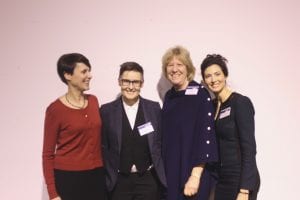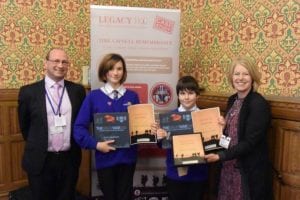UCL Connect Women in Leadership event
By ucyow3c, on 20 March 2017
By Sophie Moore, Office of the Vice-Provost (Development)
On 8 March, UCL Connect celebrated International Women’s Day with a Women in Leadership panel event exploring both the opportunities available to, and challenges faced by, women in the workforce.
Hosted by Professor Becky Francis, Director of the Institute of Education, the panel discussed key issues experienced by women on their paths to leadership roles.
There were contributions from a selection of highly successful UCL alumnae and supporters who shared advice, tips and comments from their diverse professional backgrounds, including former British Ambassador Georgina Butler, Caroline Ellis of Caroline Ellis & Associates and Director of the Precision Medicine Catapult, Professor Joanne Hackett.
With studies suggesting that women currently occupy less than 6% of leadership positions in the world’s top 500 corporations and, in the UK, earn on average 20% less than men, the event was a timely opportunity to discuss the factors that contribute to gender disparity in the workplace.
“While women are not a minority, their experience often is” explained UCL Anthropology graduate Caroline Ellis, who has made a career in tackling inequality and marginalisation, including as a former Senior Director of the charity Stonewall. “Women’s progression in the workplace is not simple; it’s a complex interaction of things.”
Indeed, while each of the panellists had experienced their own unique challenges on the road to success, the event shed light on a series of common experiences that had affected them.
The ‘imposter syndrome’ – the feeling of being fraudulent, or a lack of belief in your own skills and achievements was a familiar topic. “We are affected by different kinds of biases,” explained Ellis. “How we absorb all of these biases has a huge impact on the perceptions that we have of ourselves. We tend not to go for a job unless we fill all of the points on the specification and we tend not to negotiate as well, or take as many risks.”
Strategies the panel recommended for overcoming the ‘inner critic’ included recognising the significance in developing your skills, interests and personal relationships outside of work.
“I know that I’m good at lots of different things, which radiates through you when you’ve got people around who support you,” said Professor Hackett, who has spent 15 years working as scientist, strategist and entrepreneur. “If you can get people around you who can push you forward, as much as you’re pulling them with you, then it works.”
As one of only four female fast-streamers in the Foreign Office’s 1968 cohort of 22, UCL Laws graduate Georgina Butler has spent her entire career working in a field traditionally dominated by men. She said, “you’ve got to take control and be confident with who you are. It’s a question of deciding what you want and then fighting for it.”
Professor Francis asked the panel how much the lack of representation of women can be attributed to a lack of confidence amongst women, and how much it has to do with flaws in existing structures.
“For me it’s 50/50,” said Professor Hackett. “It’s our responsibility, but it’s also what people are expecting of us. In my former role at UCL, I managed relationships with 23 NHS trusts and 11 universities. Nine times out of ten, a chief executive would come into a meeting, look at me and say ‘I’d like some milk in my tea’ and I would be thinking ‘well, who is going to make that for them?’ It was partly my responsibility to make them aware that I was not there to make them tea – I was there because I was smart, good at my job and just as important to the room as they were – but, it was also my colleagues’ responsibility to inform them of those very same things.”
Ellis agreed and added that it’s important to get “allies” on board by helping other people to understand why gender parity is beneficial for all of us. “I wish that I had realised that my difference is actually a strength,” she reflected. “What it enables me to bring is a very different perspective to a conversation. It’s not necessarily a better idea or opinion, but diversity is really needed in every workplace.”

Adding to this the panel discussed the obligation that they felt, as women in leadership roles, to step up and affect change for other women, too.
“You’re always in a leadership position in one way or another, because all of our shadows cast long,” explained Professor Hackett. “You don’t always realise who you affect, or who looks up to you as a way of being a leader.”
Professor Francis was keen to echo this. “It is important to recognise the onus of those of us who do have power and agency in our lives. The more we have women in positions of power who challenge existing cultures, the more other women will feel entitled and able to apply.”
 Close
Close


